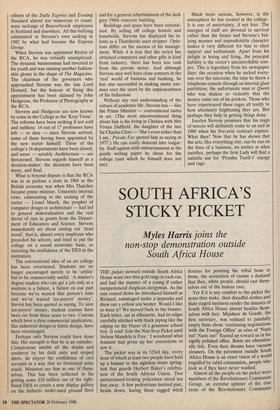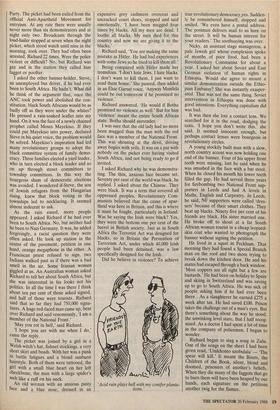SOUTH AFRICA'S STICKY PICKET
Myles Harris joins the
non-stop demonstration outside South Africa House
THE picket steward outside South Africa House wore two thin gold rings in each ear, and had the manner of a young if rather inexperienced Anglican clergyman. As the rain roared down he introduced himself as Richard, rummaged under a tarpaulin and drew out a yellow sou'wester. Would I like to wear it? We moved back to the banner. Each letter, cut in silhouette, had its edges carefully stitched with black piping like the edging on the blazer of a grammar school boy. It read `Join the Non Stop Picket until Nelson Mandela is Free.' I wondered what feminist had given up her convictions to sew it.
The picket was in its 523rd day, every hour of which at least two people have held up a banner to the sightless stone spring- bok that guards Herbert Baker's celebra- tion of the South African Union. Two embarrassed-looking policemen stood ten feet, away. A few pedestrians hurried past, heads down, hating these ragged witch doctors for pointing the tribal bone at them, the accusation of racism a demand that they, white people, should cast them- selves out of the human race.
Yet if it is any comfort to the picket the noise they make, their dreadful clothes and their staged nastiness render the inmates of South Africa House almost besides them- selves with fury. Mijnheer de Goede, the first secretary, was reduced to painfully empty hints about 'continuing negotiations with the Foreign Office' as cries of 'Nazis out! Nazis out!' floated up toward us in his rigidly polished office. Boers are obsession- ally tidy. Even their dreams have vacuum cleaners. On the pavement outside South Africa House is an exact vision of a world engulfed by rabid communists, people who look as if they have never washed. Almost all the people on the picket were members of the Revolutionary Communist Group, an extreme splinter of the true cross of the Revolutionary Communist Party. The picket had been exiled from the official Anti-Apartheid Movement for entryism. At any rate there were usually never more than six demonstrators and at night only two. Broadcasts through the loud-hailer stopped at seven when the night picket, which stood watch until nine in the morning, took over. They had often been arrested, Richard 22 times. Were the police violent or difficult? No, but Richard was gay and in the station they called him faggot or poofter.
I asked the other banner-holder, Steve, an unemployed bus driver, if he had ever been to South Africa. He hadn't. What did he think of the argument that, once the ANC took power and abolished the con- stitution, black South Africans would be as badly off as they were under the whites? He pressed a rain-soaked leaflet into my hand. On it was the face of a newly chained prophet called Moses Mayekiso. If they could put Mayekiso into power, declared Steve in his quiet voice, the problem would be solved. Mayekiso's inspiration had led many revolutionary groups to adopt the black committee system of family demo- cracy. Three families elected a yard leader, who in turn elected a block leader and so on up• through street committees to township committees. In this way the bourgeois sham of democratic elections was avoided. I wondered ifs Steve, the son of Jewish refugees from the Hungarian rising, knew that block voting in the townships led to necklacing. It seemed almost indecent to ask.
As the rain eased, more people appeared. I asked Richard if he had ever been to South Africa. No, but neither had he been to Nazi Germany. It was, he added forgivingly, a racist question they were often asked. He took up station in the centre of the pavement, petition in one hand, orange megaphone in the other. A Franciscan priest refused to sign, two Indians walked past as if there was a bad smell in the air. Some Iranian women giggled at us. An Australian woman asked Richard to tell her about South Africa, but she was interested in his looks not his Politics. In all the time I was there I think about ten per cent of those asked signed, and half of those were tourists. Richard said that so far they had 750,000 signa- tures. A huge red-faced man came up, bent over Richard and said venomously, am a member of the National Front.'
`May you rot in hell,' said Richard.
`I hope you are with me when I do,' came the reply.
The picket was joined by a girl in a Welsh witch's hat, fishnet stockings, a very short skirt and beads. With her was a punk in battle fatigues and a blond sunburst hairstyle. Both of them were tattooed, the girl with a small blue heart on her left cheekbone, the man with a large spider's web like a ruff on his neck.
An old woman with an anxious pasty face and a blue nose, dressed in an expensive grey cashmere overcoat and uncracked court shoes, stopped and said emotionally, 'I have been mugged four times by blacks. All my men are dead. I loathe all blacks. My men died for this country and now we are giving it to the blacks.'
Richard said, 'You are making the same mistake as Hitler. He had bad experiences with some Jews so he tried to kill them all.'
Being compared with Hitler made her tremulous. 'I don't hate Jews, I hate blacks. I don't want to kill them, I just want to send them home.' She paused, then added in an Elsie Garnet voice, 'Anyway Mandela could be out tomorrow if he promised no violence.'
Richard answered, 'He would if Botha promised no violence as well.' But for him `violence' meant the entire South African state. Botha should surrender.
I was sure that the old lady had no more been mugged than the man with the red face was a member of the National Front. This was shouting at the devil, driving away bogies with yells. It was on a par with nobody on the picket ever having visited South Africa, and not being ready to go if invited.
I asked Richard why he was demonstra- ting. The thin, anxious face became set. Seventy per cent of the world was black, he replied. I asked about the Chinese. They were black. It was a term that covered all oppressed peoples. Revolutionary Com- munists believed that the cause of apar- theid was here in Britain, and this is where it must be fought, particularly in Ireland.
Was he saying the Irish were black? Yes, they were the bottom one per cent of the barrel in British society. Just as in South Africa the Terrorist Act was designed for blacks, so in Britain the Prevention of Terrorism Act, under which 40,000 Irish people had been detained, was a law specifically designed for the Irish.
Did he believe in violence? To achieve `Acid rain plays hell with my conifer planta- tions.' true revolutionary democracy,yes. Sudden- ly he remembered himself, stopped and smiled. 'We even have a postal address. The postman delivers mail to us here on the street. It will be human interest for your readers.' The soothsaying was over.
Nicky, an assistant stage manageress, a pale Jewish girl whose complexion spoke of months of poor food, had been a Revolutionary Communist for about a year. I asked her about Soviet and East German violation of human rights in Ethiopia. Would she agree to mount a similar demonstration outside the Ethio- pian Embassy? She was instantly exasper- ated. That was not the same thing. Soviet intervention in Ethiopia was done with good intentions. Everything capitalism did was bad.
It was then she lost a contact lens. We searched for it in the road, dodging the taxis. 'I hope you don't write this,' she said. It seemed innocent enough, but perhaps contact lenses were bourgeois in revolutionary circles.
A young stockily built man with a slow, north country accent was now holding one end of the banner. Four of his upper front teeth were missing, lost he said when he was smashed in the face with a bar stool. When he closed his mouth his lower teeth filled the gap. He had served three years for firebombing two National Front sup- porters in Leeds and had A levels in Maths, English and Carpentry. In Leeds, he said, NF supporters were called 'dres- sers' because of their smart clothes. They beat up blacks. Ninety five per cent of his friends are black. His sister married one. He broke off to shout at a fat South African woman tourist in a cheap leopard- skin coat who wanted to photograph the banner without signing the petition.
He lived in a squat in Peckham. That morning they had found a Special Branch man on the roof and two more trying to break down the kitchen door. He and his mates had escaped through a back window. `Most coppers are all right but a few are bastards.' He had been on holiday to Spain and skiing in Switzerland and was saving up to go to South Africa. He was sick of people asking him if he had ever been there . As a slaughterer he earned £275 a week after tax. He had saved £100. Prison takes the challenge out of a man's eyes. But there's something about the way he stood, the unwinking level stare, that I half recog- nised. As a doctor I had spent a lot of time in the company of policemen. I began to wonder.
Richard began to sing a song in Zulu.
One of the songs on the sheet I had been given read, `Umkhonto uzobulala' — 'The spear will kill.' It meant the Boers, the Children of the Book, silent, blond and doomed, prisoners of another's beliefs.
When they die many of the faggots that go to burn them will have been heaped by our hands, each signature on the petitions another twig for the flames.



















































 Previous page
Previous page